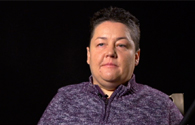Blindness and Non-24
Non-24 arises from an inability to perceive light
Benjamin, age 31: "I get very tired very quickly even if I've rested. My symptoms make me feel like I'm not in control."
In the United States, 1.3 million people are legally blind, and 130,000 are totally blind. Some of the main causes of total blindness include retinoblastoma, retinitis pigmentosa, retinopathy of prematurity, glaucoma, ocular trauma, diabetes, or developmental disorder of the eye.
Among people who are totally blind, as many as 70% suffer from the effects of Non-24, which comes about due to a lack of light perception.
The eye has two functions. One is to see, and the other is to take in light, which signals the time of day to the brain.
Lack of light perception is a key factor in the onset of Non-24, which can happen at any age, regardless of the cause of blindness. The master body clock runs longer than 24 hours a day and is reset every day by environmental light that enters the eyes and strikes photosensitive cells that signal the brain.
Do you have symptoms of Non-24?
Non-24 is not a sleep disorder. It is a serious, chronic circadian rhythm disorder that can greatly impact your life.
If you have some of the symptoms, whether to a mild or intense degree, you may have Non-24.
A few of the key symptoms are:
- trouble falling asleep or staying asleep
- waking up groggy or not feeling as if you've gotten enough rest
- an overwhelming urge to sleep during the day or falling asleep unexpectedly
- difficulties in managing school or work
- problems with concentration

Non-24 can sometimes be more challenging than blindness itself
Terri talks about how it's the frustrating symptoms of Non-24, not her blindness, that can often get in the way.
Speak with your doctor about Non-24
If you think you may have Non-24, it's a good idea to speak with your doctor about it so that together you can determine if you may have Non-24. Keep in mind that awareness of Non-24 is low and your doctor may not be aware of Non-24. The Doctor Discussion Guide, with advice on how to talk to your doctor about the impact of Non-24 on your life, is designed to help you have this conversation.
You can also share a special overview video about Non-24 with your doctor. In just a few minutes, it clearly explains the cause and characteristics of the condition. It's designed to introduce you and your doctor to Non-24 and help you to create a well-informed plan together to help you manage Non-24's impact on your life.
Understand more about Non-24
Sign up to get the latest Non-24 news and information
Could you have Non-24?
The key symptoms of Non-24 are the inability to sleep or stay asleep at night and a powerful urge to sleep during the day. If this sounds familiar, check the other symptoms.
Non-24 FAQs
Because awareness about Non-24 is low, refer to these FAQs to give you some of the answers you need.
 Share via Facebook
Share via Facebook Share via Twitter
Share via Twitter Follow us on YouTube
Follow us on YouTube
